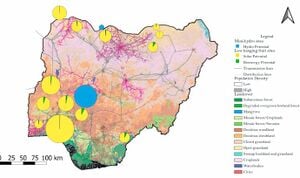
With the vast rural population, the availability of locational renewable energy resources and limited finances in low-income (developing) countries, there is the need for an integrated and holistic energy planning framework to unlock their potential for achieving energy-based economic development. The integrated rural energy planning framework provides a unified road map for energy planning and system design with renewable energy integration geared towards improving energy access in rural areas. Therefore, this study presents the application of case studies to this framework to foster improved localized renewable energy access in low-income (developing) countries. Using rural Nigeria as the geographic scope, the site identification and selection and the locational estimation of annual energy demand steps of the framework are performed for rural areas. Utilizing GIS-based tools, rural communities are identified, and their viable renewable energy resources are estimated. Adopting the reference building approach, seasonal disaggregated energy demand profiles are obtained at community scale with an hourly time-step. These are obtained in the absence of smart-metering equipment and measured datasets on energy use. The obtained results provide insights to inform localized energy policy design by combining rural electrification with energy conservation strategies. This framework has wide applicability across areas with similar energy access and rural development issues especially in sub-Saharan Africa and developing Asia.
Highlights[edit | edit source]
- Case study applications presented on the integrated the rural energy planning framework.
- "Brownfield" locations identification scheme to select low hanging fruits sites.
- Hourly energy demand profile obtained for rural areas without smart metering.
- Insights to inform localized energy policy design by combining rural electrification with energy conservation strategies.
See also[edit | edit source]
- Decentralized Renewable Hybrid Mini-Grids for Rural Communities: Culmination of the IREP Framework and Scale up to Urban Communities
- Low emissions analysis platform model for renewable energy: Community-scale case studies in Nigeria
- Adapting the European typology approach for building stock energy assessment (TABULA) concept for the developing world: The Nigerian case study
- Economic viability of captive off-grid solar photovoltaic and diesel hybrid energy systems for the Nigerian private sector
- Levelized cost of electricity for solar photovoltaic, battery and cogen hybrid systems
- Performance of U.S. hybrid distributed energy systems: Solar photovoltaic, battery and combined heat and power
- Emerging economic viability of grid defection in a northern climate using solar hybrid systems
- The Potential for Grid Defection of Small and Medium Sized Enterprises Using Solar Photovoltaic, Battery and Generator Hybrid Systems
- Achieving 100% Renewable and Self-Sufficient Electricity in Impoverished, Rural, Northern Climates: Case Studies from Upper Michigan, USA
- A Free and open-source microgrid optimization tool: SAMA the Solar Alone Multi-Objective Advisor





